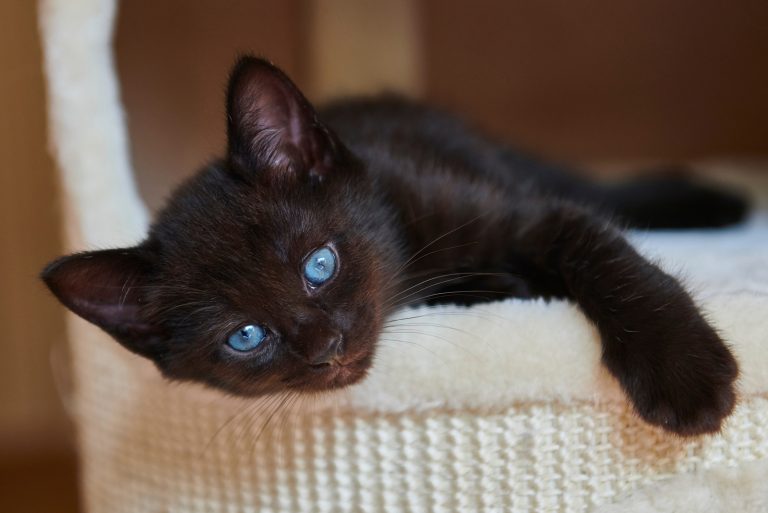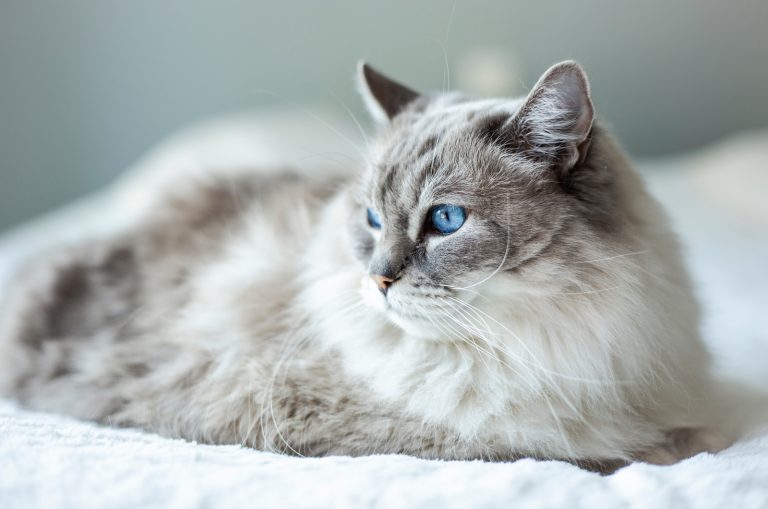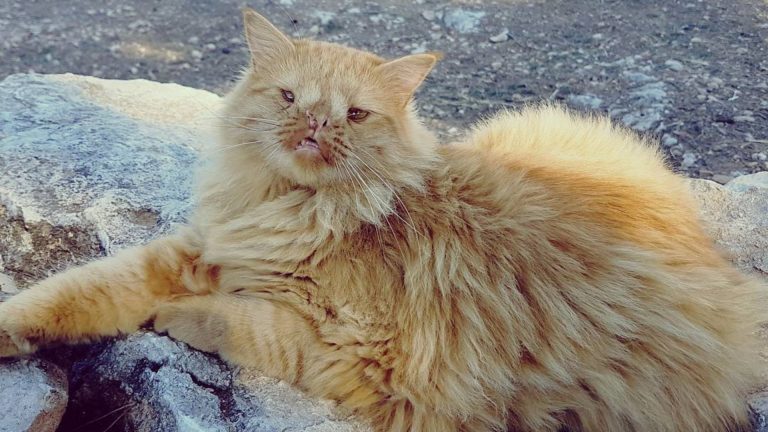Top 8 Natural Sedatives For Cats: Safe Ways To Relax A Cat
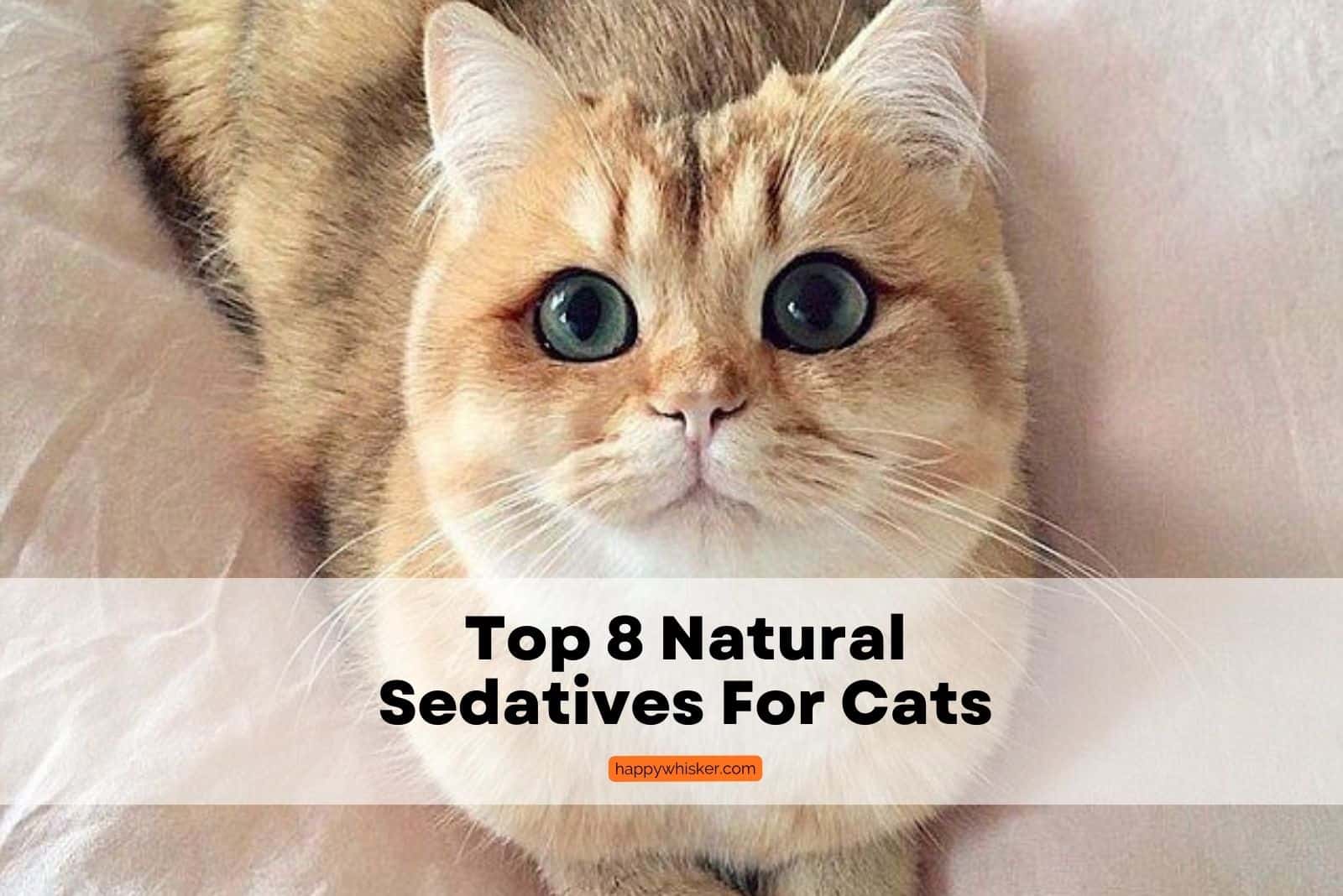
This post contains affiliate links, and I will be compensated if you make a purchase after clicking on my links, at no extra cost to you.
Has your kitty been feeling anxious or stressed lately? If yes, I’m sure you’re on the look-out for how to relieve your cat’s anxiety and stress. A solution I’m proposing is – natural cat sedatives!
Natural sedatives for cats are plants that have been traditionally used for their calming and relaxing properties.
In this article, we will discuss how they can be used, the potential benefits and risks to using them, and most importantly – how to use them safely and effectively!
Top 8 Natural Sedatives For Cats
Herbs can be a great way to gently sedate a cat to help it relax and calm down. The herbs I’ll mention below can have a calming and sedating effect on cats and help reduce their anxiety levels.
Let’s talk about the top 8 cat-safe plants that will help your cat relax!
Catnip (Nepeta cataria)
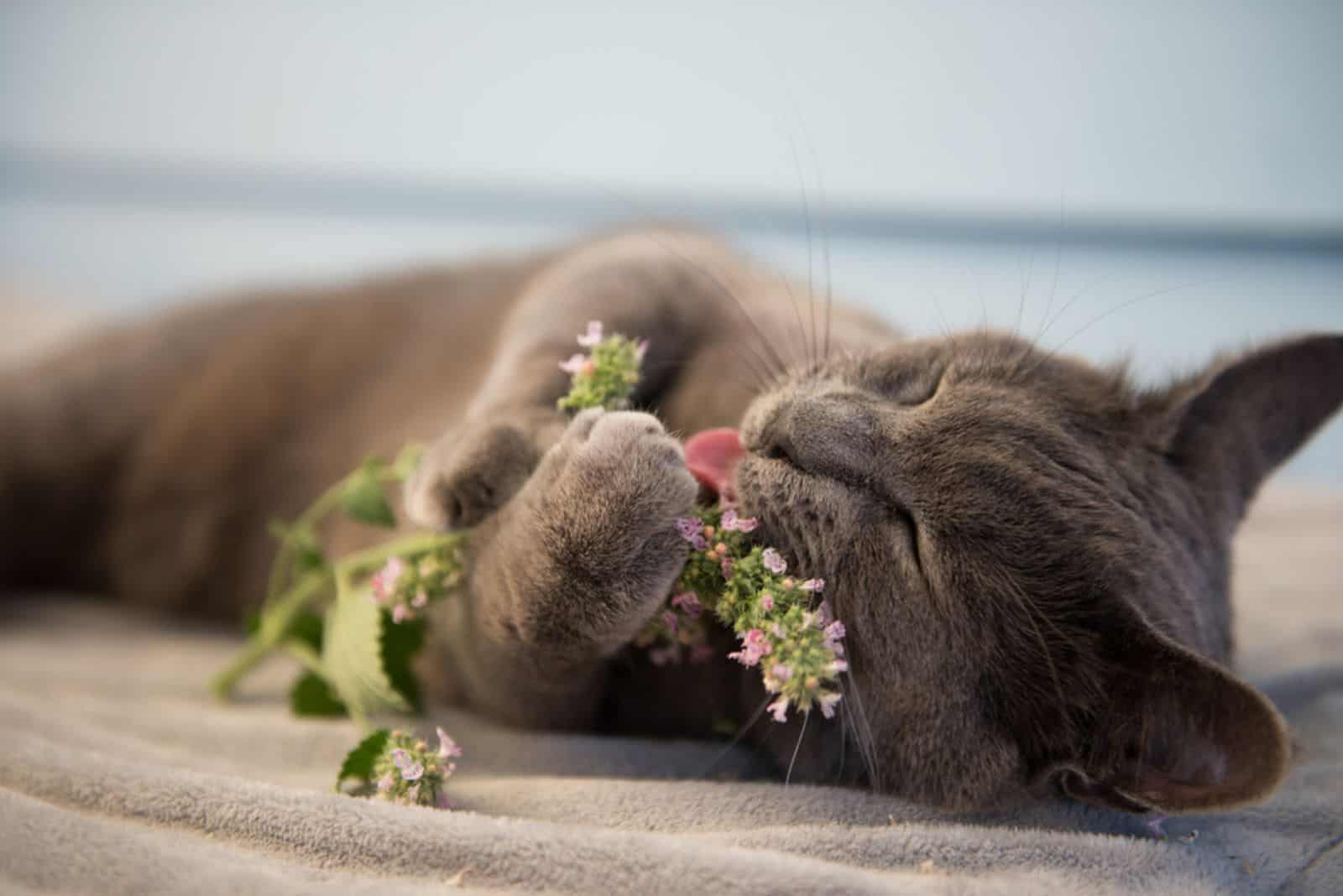
Most Important Info About Catnip
Catnip (Nepeta cataria) is a plant that belongs to the mint family. It is native to Europe and Asia and has been introduced to other parts of the world, including North America.
Catnip is commonly grown as an ornamental plant with adorable heart-shaped leaves, but it is also prized for its ability to attract and stimulate cats.
The active ingredient in catnip that attracts and stimulates cats is a chemical called nepetalactone, which is found in the plant’s leaves and stems.
When a cat inhales or ingests nepetalactone, it can produce a sedative effect, as well as excitement and increased playfulness. Some cats may become more relaxed or less reactive when exposed to catnip, appearing lightly sedated.
How To Safely Give Catnip To Cats
• Offer fresh catnip
Fresh catnip may be grown in a planter, bought at a pet store, or ordered online. Simply arrange a tiny amount of the leaves and stems in a dish or on a cat toy to give your cat fresh catnip.
• Use dried catnip
To use dried catnip, sprinkle just a tiny amount of it on your cat’s toy. You can also add a small amount to your cat’s food or water.
• Use a catnip-infused toy
There are many toys available that are infused with catnip and designed to attract and stimulate cats, and they can be purchased at a pet store or online.
Chamomile (Matricaria chamomilla)

Most Important Info About Chamomile
Chamomile is a flowering plant in the daisy family that has been used for centuries as a medicinal herb to soothe and relax. It has anti-inflammatory and anti-bacterial properties and is also known to be a mild sedative!
Chamomile is a natural herb considered safe for cats but should be used cautiously. In small doses, chamomile can help calm an anxious cat and may even treat some digestive issues.
However, it is essential to note that chamomile can be toxic in large doses and should not be given to cats without consulting a veterinarian first.
How To Safely Give Chamomile To Cats
If you give your cat chamomile, it is best to use a herbal tea blend specifically made for cats.
Prepare a herbal tea by steeping it for around thirty minutes. You can give your pet 2-3 drops twice daily, either directly in their mouth or mixed in with their food. Alternatively, let your feline drink the drops directly.
In addition, chamomile should only be given in its dried form, as the fresh form can irritate your cat’s mouth and stomach.
Pet owners, please, make sure not to give your cat too much chamomile, as high concentrations of chamomile are known to cause adverse effects in cats.
Silver Vine (Actinidia polygama)
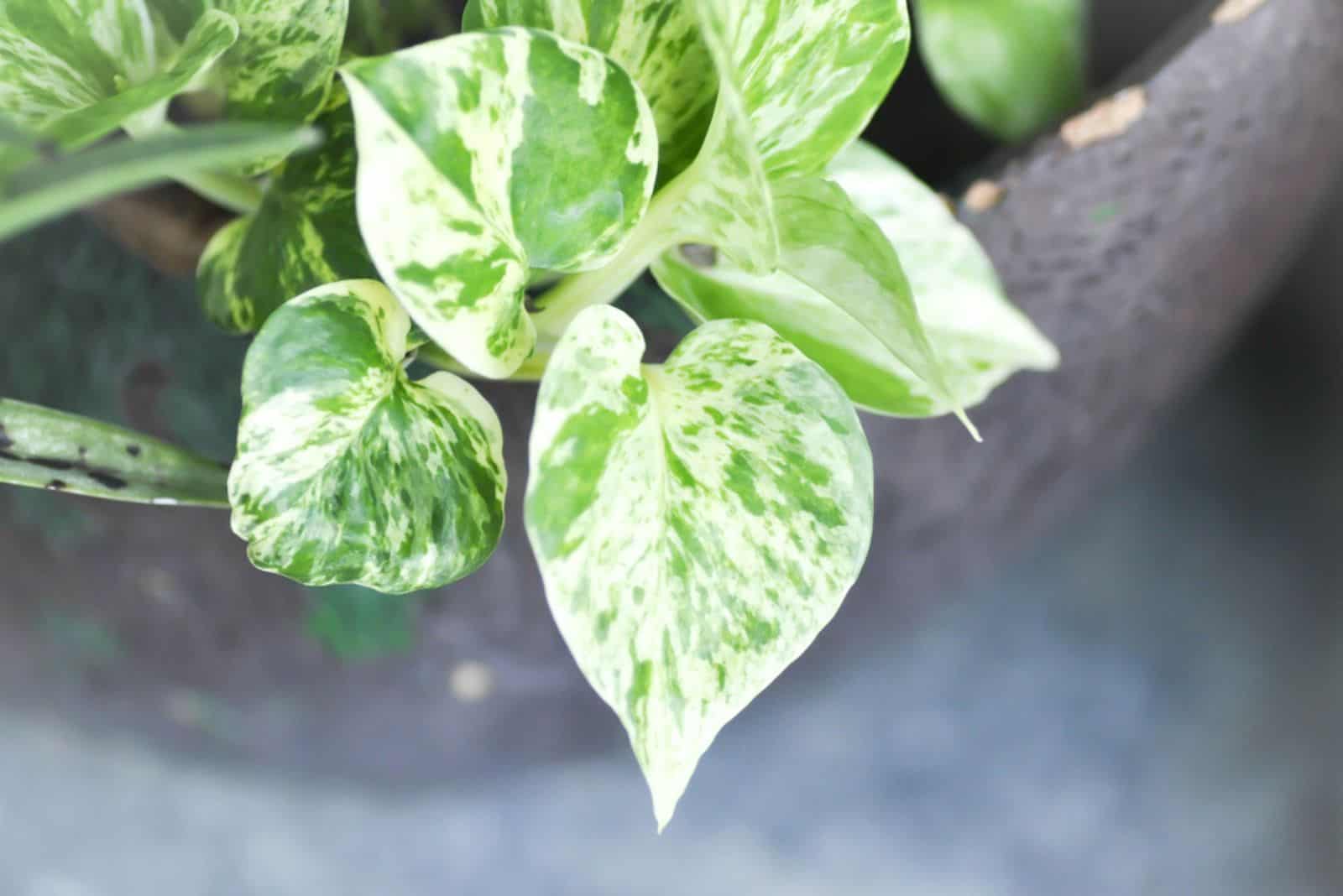
Most Important Info About Silver Vine
Silver vine (Actinidia polygama) is a plant species native to parts of China and Japan. It is known for its attractive silver-gray foliage and fragrant white flowers.
Silver vine is also known for its ability to produce a cat attractant, a compound called nepetalactone that is found in the plant’s leaves and stems.
When cats encounter silver vine, they may display behaviors such as rolling, rubbing, and chin- and cheek-marking, similar to how they respond to catnip.
There are some potential health benefits associated with silver vine, and it is thought to have antioxidant and anti-inflammatory properties.
How To Give Silver Vine To Cats
Dried silver vine is generally considered safe for cats to consume in small amounts only.
Silver vine sprays and toys can also be used, but be sure to follow the manufacturer’s instructions for use.
It is not recommended to give your cat large amounts regularly. Overconsumption of silver vine can lead to digestive upset and other adverse side effects.
It is important to note that silver vine is not toxic to cats, but it is not recommended for use in pets with underlying health conditions or those that are pregnant or nursing.
Lavender (Lavandula angustifolia)

Most Important Info About Lavender
Lavender is a blooming plant in the mint family that is indigenous to the Mediterranean.
It’s popular for its aromatic blossoms and essential oils.
It has been used for ages in fragrances, cosmetics, and herbal treatments because of its soothing effect.
Lavender has been shown to have a relaxing impact on cats, reducing tension, anxiety, and restlessness.
How To Safely Give Lavender To Cats
Use a diffuser or spray a tiny quantity of essential oil into the air. Before using the oils, dilute them in a carrier oil, such as almond or coconut oil.
Diffusing diluted lavender oil can help distribute the fragrance in the area without exposing your cat to it directly.
It is crucial to remember that cats can be sensitive to essential oils, so use lavender oil carefully!
It is also crucial to choose a high-quality, therapeutic-grade lavender oil when using lavender oil for cats.
John’s Wort (Hypericum perforatum)

Most Important Info About St. John’s Wort
Although not many people are familiar with it, St. John’s wort (Hypericum perforatum) has been used for centuries!
It is a natural remedy for various medical conditions, such as depression, anxiety, and sleep disorders in humans.
The active ingredient in St. John’s wort is hypericin, which is thought to affect the levels of chemicals that play a role in regulating mood!
How To Give St. John’s Wort To Cats
St. John’s Wort is usually administered to cats orally as a pill, tablet, liquid extract, or powder.
If you decide to feed it to your cat, be sure to give it with your cat’s food!
It is critical to carefully measure liquid forms and not exceed the recommended dosage.
Side effects such as vomiting, diarrhea, dry mouth, skin responses, allergic reactions, restlessness, or tiredness are possible, and they are more likely to occur at greater dosages.
Lemon Balm (Melissa officinalis)
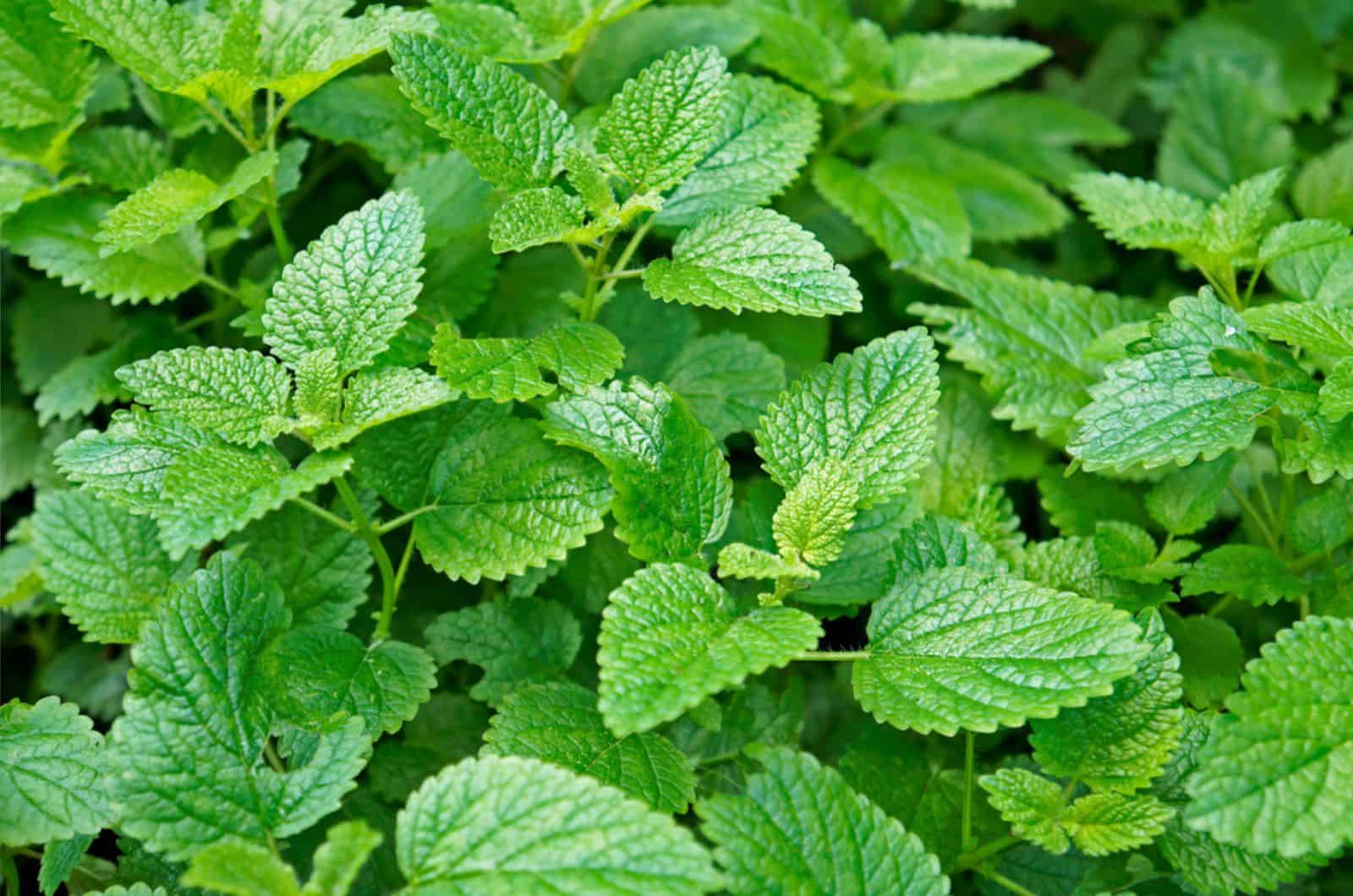
Most Important Info About Lemon Balm
For humans, lemon balm is often used to make herbal teas and tinctures, due to its antiviral and anti-inflammatory properties.
Additionally, lemon balm is thought to have a calming effect on the body and mind, and it is believed the herb has the same effect on cats as well!
While lemon balm may have some potential health benefits for cats, it is generally only recommended to give it to cats under the guidance of a veterinarian or a certified animal aromatherapist.
How To Give Lemon Balm To Cats
If you do decide to use lemon balm on your cat, make sure to dilute the essential oil with a carrier oil like almond or coconut oil before putting it in an oil diffuser.
Never apply essential oils directly to your cat’s skin or fur!
If ingested, lemon balm can potentially cause gastrointestinal upset and other adverse effects.
Passionflower (Passiflora incarnata)
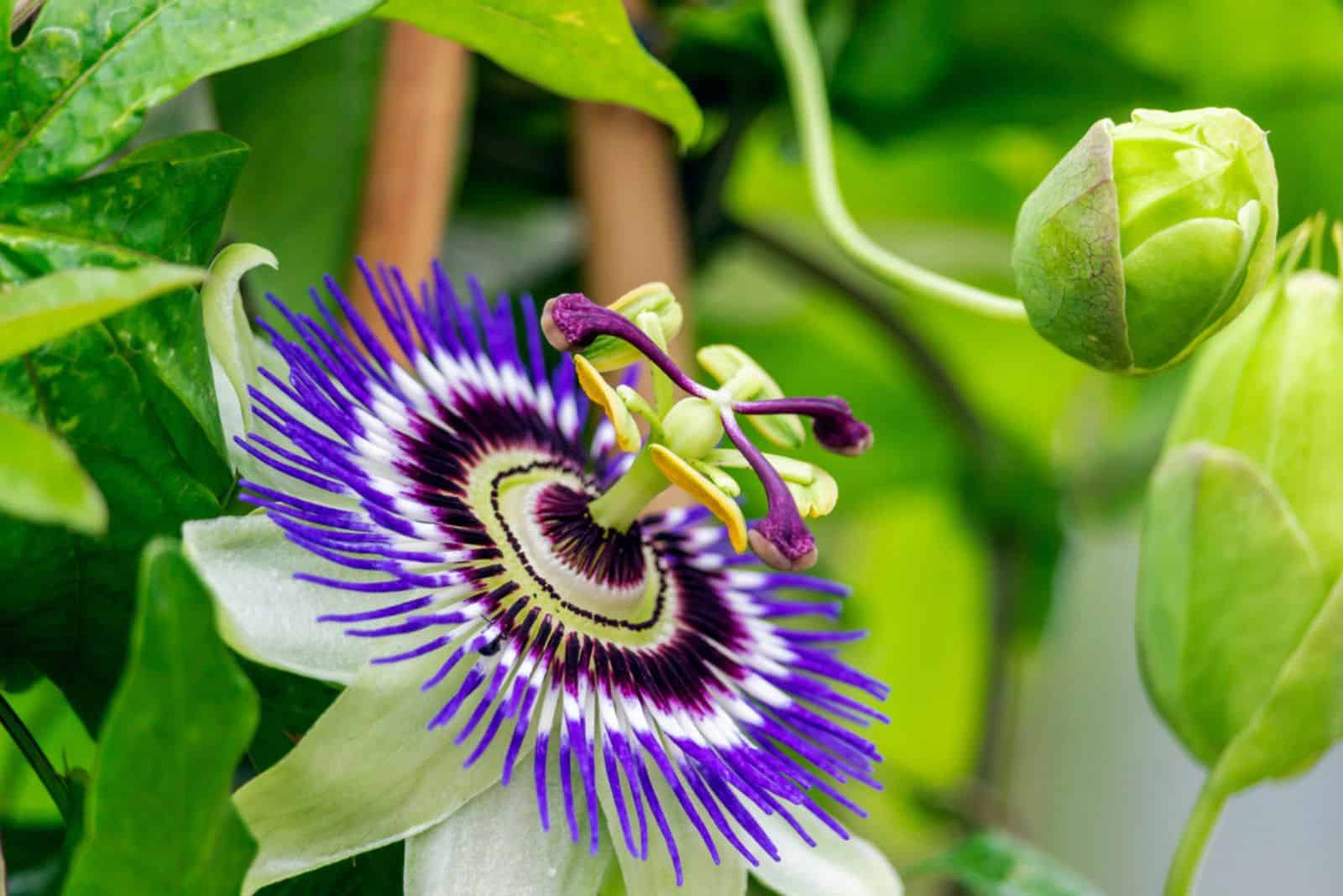
Most Important Info About Passionflower
For centuries, passionflower has been used as a natural cure to help with anxiety and sleeplessness in people. It is believed to function by boosting gamma-aminobutyric acid (GABA) levels in the brain, which is a neurotransmitter that aids in reducing stress and promoting relaxation!
Passionflower has been used to help cats with anxiety and stress. Still, it is crucial to speak to your veterinarian before giving your cat any supplement, as passionflower can interact with other medications.
While passionflower may have some potential health benefits for cats, it is generally only recommended to give it to cats under the guidance of a veterinarian or a certified animal aromatherapist.
How To Give Passionflower To Cats
The best way to give passionflower to cats is in the form of diluted essential oil diffused into the air.
Dilute your essential oil with a carrier oil, such as coconut or olive oil. Start with one drop of essential oil mixed with 10 drops of carrier oil. Allow the diffuser to run for no more than 15 minutes at a time.
Monitor your cat’s response. Ensure your cat is not having any adverse reactions to the oil. If your cat seems more agitated or uncomfortable, stop diffusing the oil and consult your veterinarian.
Keep the oil away from your cat. Store the passionflower oil in a secure place where your cat cannot access it. This will help prevent any accidental ingestion.
Cat Thyme (Teucrium polium)
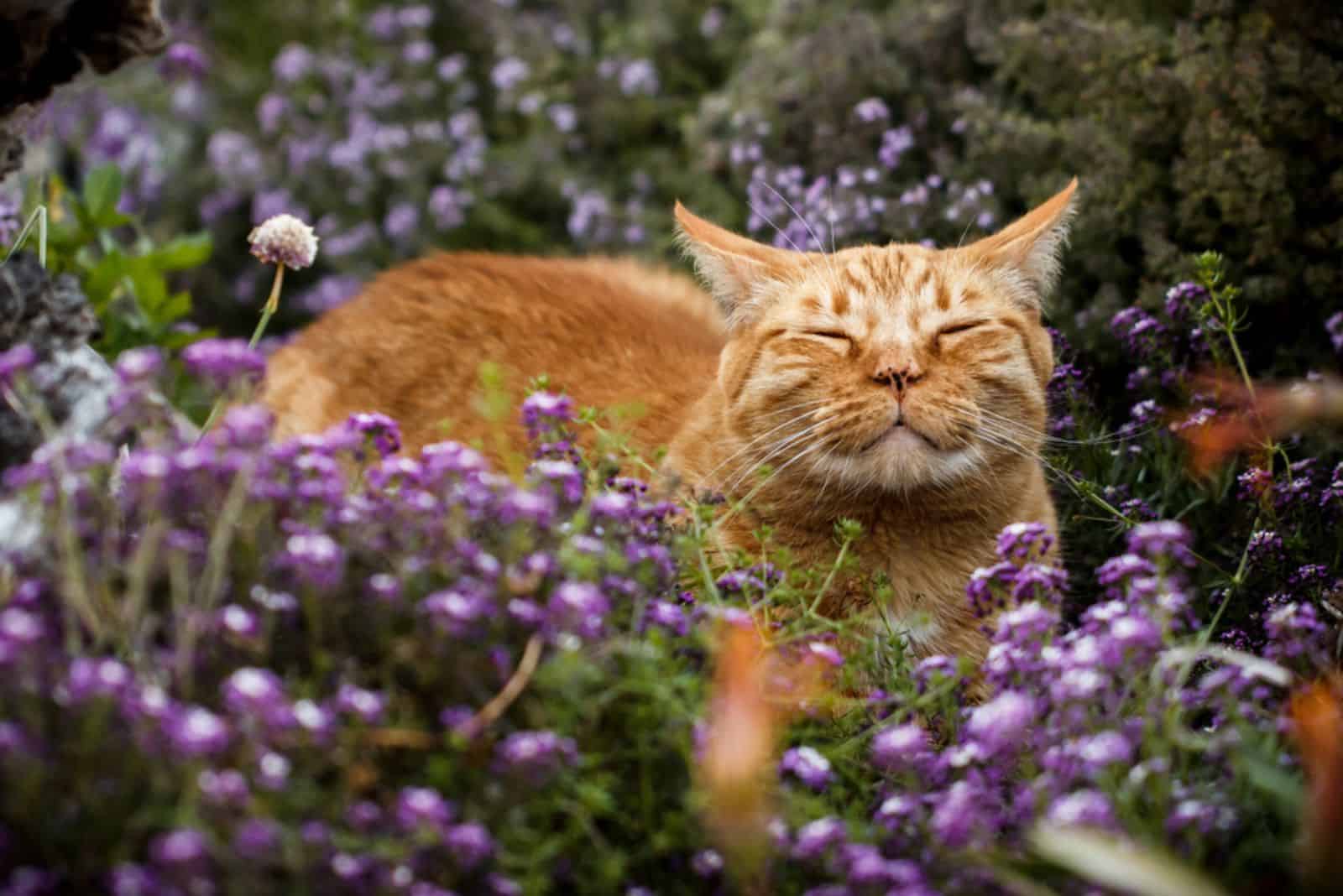
Most Important Info About Cat Thyme
The perennial plant cat thyme (Teucrium marum) is endemic to the Mediterranean area. It is distinguished by its little purple blooms and spicy, scented foliage.
Cat thyme (Teucrium marum) gets its name from a chemical called nepetalactone, which is believed to attract cats.
Giving your pet cat thyme can be beneficial for their overall health. Thyme is a natural herb packed with antioxidants and has anti-inflammatory, anti-bacterial, and antifungal properties.
How To Give Cat Thyme To Cats
Only use organic, fresh cat thyme! Grind the cat thyme into a powder and mix it with a tablespoon of water.
Once you have mixed the cat thyme, please give it to your cat by adding it to their food. Start by giving them a small amount only.
Keep an eye on your cat for any negative responses, and if you notice any, stop using cat thyme immediately.
Giving thyme to your cat can help boost their general health and well-being!
A Quick Mention: Other Products That Efficiently Calm Down Cats
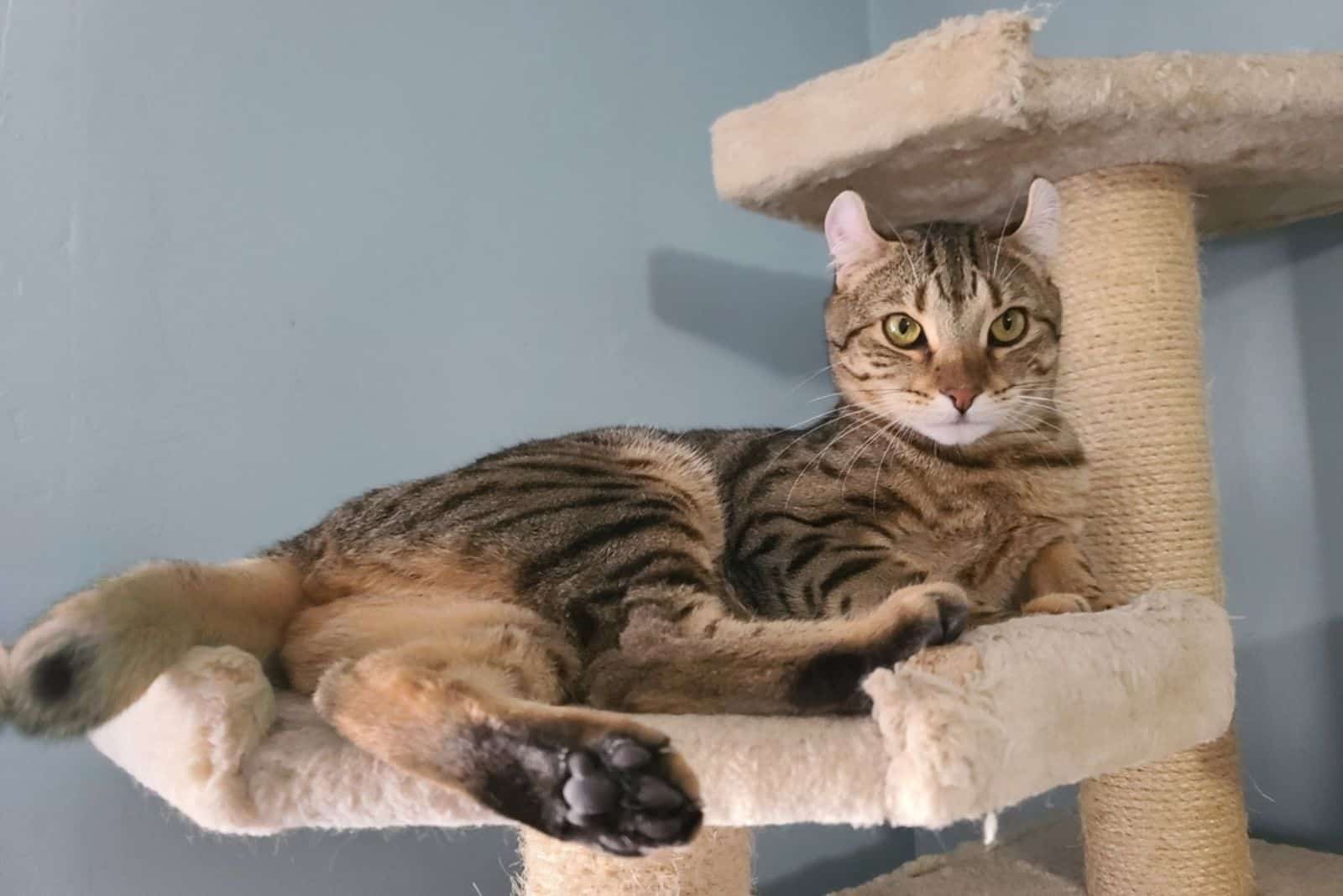
If you want to try something else to lightly sedate a cat, some products are designed to do just that! Some of my favorite ones are:
1. Bach Rescue Remedy Pet Dropper
Rescue Remedy Pet Dropper is a natural solution for anxious or stressed pets. Developed by Dr. Edward Bac, this homeopathic remedy uses a unique blend of five flower essences to help relieve stress and worry in pets.
It helps pets cope with stressful situations such as vet visits, car rides, or loud noises (such as fireworks). It can also be used to help pets adjust to new environments, such as a new home.
2.Pet Naturals Calming Chews For Cats
Pet Naturals chews are a natural supplement that helps cats cope with stress and anxiety. These chews contain a special combination of ingredients, including L-Tryptophan, Thiamine, Colostrum, and Valerian Root.
These components aid in reducing stress-related behaviors including scratching, hostility, and meowing. Additionally, they are designed to aid cats in unsettling situations by calming them down and helping them relax.
3. VETRISCIENCE Composure Calming Treats For Cats
VetriScience calming treats are a delicious and easy-to-administer chewable supplement for cats.
The treats contain natural ingredients like chamomile, L-Tryptophan, and thiamine to help reduce your cat’s stress and anxiety levels!
4. FELIWAY Classic Cat Calming Pheromone Diffuser
FELIWAY Classic Cat Calming Pheromone Diffuser is a product designed to help cats feel secure and comfortable in their environment by releasing a synthetic version of the natural calming cat pheromone cats use to mark their territory as safe and secure.
5. ThunderShirt – A Classic Cat Anxiety Jacket
You might not have known this, but thundershirts can make cats more relaxed!
The jacket functions by giving continual, mild pressure to the body, which has been shown to relax cats.
For cats that experience separation anxiety, noise phobia, or other stressful situations, ThunderShirt might just be the ideal remedy.
Why Would A Cat Need To Be Sedated?
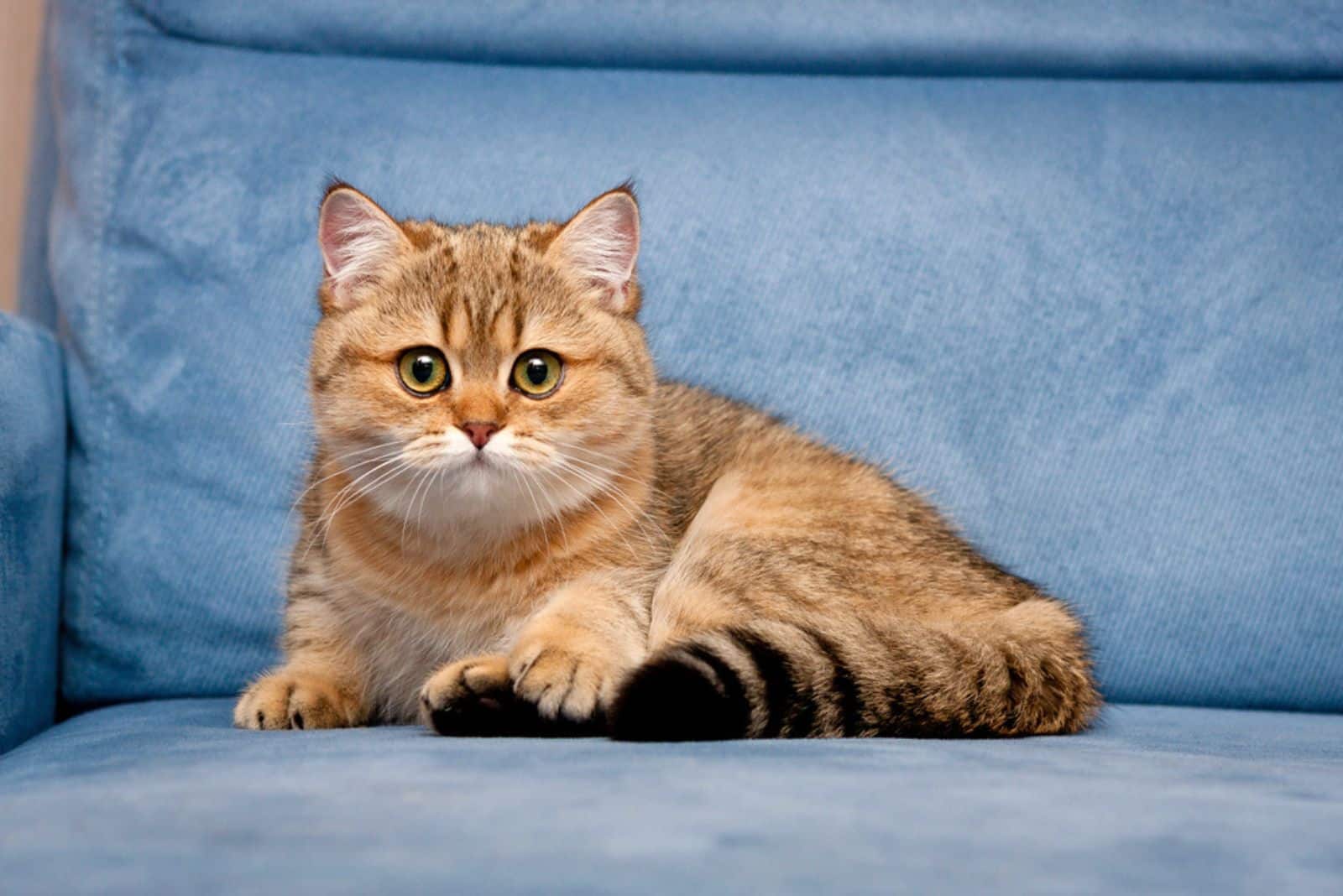
Sedation helps reduce the cat’s stress and anxiety and makes it easier for the cat owner and the rest of the family to live with the cat in question.
Let’s talk a bit about why a cat needs to be sedated?
1. Due To Anxiety Or Stress
It is possible for a cat to need to be sedated because it is stressed. Cats get anxious due to various stressful events, such as:
• Loud noises, such as fireworks or thunderstorms
• Changes in routine or environment
• Separation from their owners
• Being introduced to new people or animals
• Living with multiple cats in a small space
• Moving to a new home
• Too much petting or handling
• Being held or restrained
2. Due To Displaying Behavioral Issues
Cats may need to be sedated if they display aggressive or destructive behavior or are excessively anxious or stressed. Sedation can help calm the cat and make it easier to address the underlying cause of the behavior.
3. To Make Transportation Easier
Cats may need to be sedated for transportation, especially if they are prone to motion sickness or anxiety during car rides. Sedation can help make the trip more comfortable for the cat.
4. To Make Grooming Easier
Cats may need to be sedated for grooming procedures, such as haircuts or nail trimmings if they are excessively anxious or difficult to handle during those times.
Sedation can help make the grooming process a whole lot more manageable and less stressful for the cat!
What Should I Do If Natural Cat Sedatives Aren’t Working?
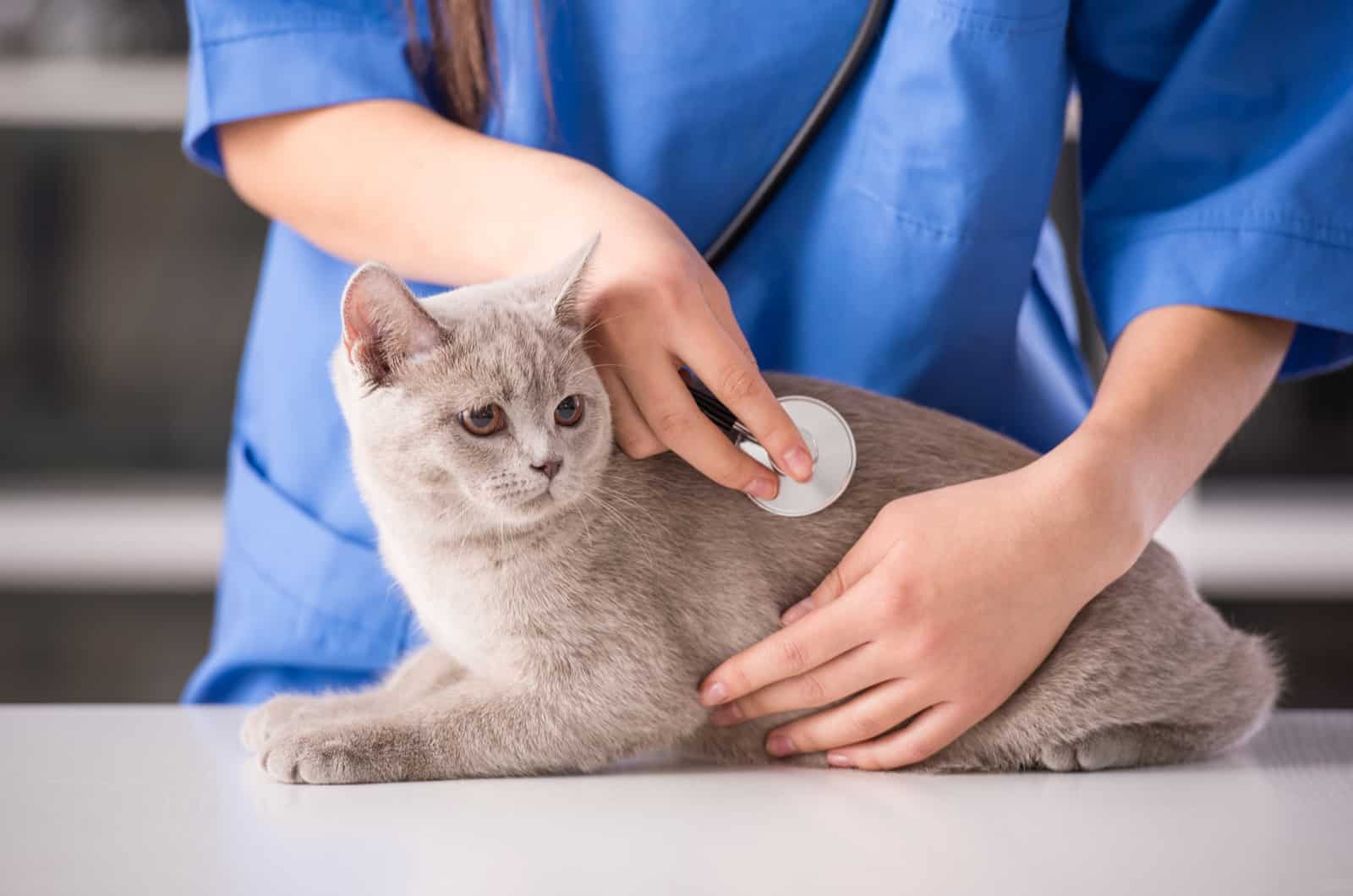
If natural cat sedatives are not working, there are a few steps you can take:
1. Consult With A Veterinarian
It is essential to consult with a veterinarian if natural sedatives are not working for your cat. Your veterinarian can help determine the cause of your cat’s anxiety or other behavioral issues and recommend the best treatment.
2. Consider Other Treatment Options
If natural sedatives are ineffective, your veterinarian may recommend other treatment options, such as over-the-counter medication (that doesn’t need to be prescribed) or even prescription medications.
The vet may be able to provide a prescription medication (such as anxiety medication) that is more effective in helping calm your cat.
3. Address The Underlying Cause Of Your Cat’s Anxiety
Identifying and addressing the underlying cause of your cat’s anxiety or stress is the key to successfully making your cat more relaxed!
Once you find out what is causing your cat’s anxiety or stress, you’ll be able to handle it accordingly.
In Conclusion
In conclusion, natural sedatives can be a safe and effective option for calming your feline!
Some popular herbs used as natural sedatives for cats include catnip, chamomile, lavender, lemon balm, passionflower, and hops!
However, it is essential to note that these herbs may interact with your cat’s medications or have other side effects.
Additionally, it is important to keep all plants and herbs out of your cat’s reach!
Stay safe, and I hope some of these herbs will help calm down your feline!
Related Articles:
• 11 Safe And Effective Over The Counter Sedatives For Cats
• Comfort Zone Vs Feliway: Which Pheromone Diffuser Is Better?
• Top 9 Natural Home Remedy Antibiotics For Cats: User Guide

